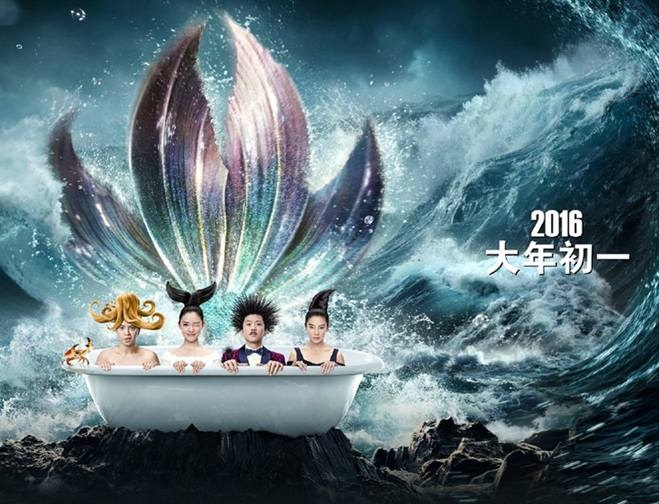By Austin Dean
First released in China on February 8th, The Mermaid (Meiren yu) took less than two weeks to become the highest-grossing film in the history of mainland Chinese cinema. The same day it passed that milestone in China (February 19th), the film opened in limited release in the United States. Playing on only 35 screens, the movie brought in just over a million dollars at the weekend box office.
That doesn’t sound like a lot, but it put The Mermaid 16th out of the 50 films playing that weekend, and its average take per screen was a very high $29,000. It was actually the biggest opening weekend for a Chinese movie in the United States in more than a decade. By the first weekend in March, the movie had grossed just over $2.5 million at the American box office. The Columbus, Ohio AMC theatre where I saw it on a Sunday afternoon was nearly full, and not just with Chinese viewers.
The Mermaid is the latest in a series of Chinese blockbusters like Lost in Thailand and Lost in Hong Kong to get a limited U.S. release. In fact, the release of The Mermaid was so limited that apparently some executives at Sony — which distributed the film — didn’t even know it was playing in the United States. As critic Simon Abrams wrote, “Sony ought to be ashamed for keeping such a good film from American viewers who aren’t already part of the Chinese diasporic community.”
Directed by Stephen Chow, whose previous movies like Kung Fu Hustle and Shaolin Soccer are equal parts slapstick and irreverent, The Mermaid has a strange alchemy of physical humor, tragedy, word play, violence, comedic symmetry, and cruelty. Leaving the theatre, it was hard to answer a seemingly common question: What kind of movie did I just see?
Like many aspects of China today, the film begins with a shady real estate deal. Liu Xuan (Deng Chao), a property tycoon who started from nothing and now has everything except morals and taste, acquires a vast tract of land near the fictitious Green Gulf. The other bidders think the land can’t be developed due to environmental restrictions meant to protect dolphins. Liu, no stranger to underhanded tactics, manufactures a solution: the dolphins won’t need to be protected if they aren’t there. He installs a powerful sonar device that drives out the dolphins and secures a permit for reclamation and building. His solution could be a case study in “How to Do Business in China 101.”
The sonar, however, also killed a number of mermaids. The remaining mermaids, led by Brother Eight (Show Luo), a vengeful half-man half-octopus with dreadlocks, want Liu dead. They set up a honey trap using the young, beautiful, and naïve Shan (Lin Yun). After a series of double entendres, slapstick humor involving poisonous sea urchins, singing, and dancing, the two fall in love. Liu decides to cancel the project and turn off the sonar; the pretty mermaid has redeemed the corrupt billionaire. That doesn’t sit well with Ruo Lan (Zhang Yuqi), another property tycoon, who had set up a side deal with Liu regarding the reclamation project. But there are other factors at play. And the movie — interrupted by a Chinese-style traffic jam — comes to a gory crescendo.
The Mermaid is undeniably funny, but the changes in tone are abrupt, especially towards the end of the film. One moment the viewer is stuck in traffic and the next she’s watching young mermaids get shot. It can be a bit uncomfortable. The woman sitting next to me was laughing at the middle but crying at the end.
These shifts didn’t go unnoticed by critics. The reviewer at The Guardian notes that the film often finds itself in “troubled tonal waters.” Glen Kenny of The New York Times doesn’t think the movie falters under its undulating emotional landscape because “Mr. Chow’s signature is so sure that the tonal changes have a unity born of conviction.”
But there’s something more to be said about this. What’s distinct about The Mermaid is that watching the film gives the viewer a sense of what it’s like to be in China: full of incongruities, sometimes sad, sometimes funny, sometimes bizarre. The point here is not to exoticize the country, but rather to say that life there today can be hard to pin down.
Perhaps the most common question an American gets after returning from China is the predictable one: “What is China like?” The only honest answer I’ve ever been able to come up with to this query is to say “Pick any adjective in the English language. China, at a particular moment, is like that. Then, not long thereafter, it’s like another adjective.”
The same thing can be said about The Mermaid.


